
Shih Tzus are known for their beautiful, expressive eyes, which are one of their most endearing features. However, those big, bright eyes also require special care to keep them healthy and prevent common eye problems. As a Shih Tzu owner, understanding how to properly care for your dog’s eyes is essential to maintaining their overall well-being. This blog post will guide you through everything you need to know about caring for your Shih Tzu’s eyes, from daily cleaning routines to recognizing signs of potential eye issues. With proper care, you can help ensure your Shih Tzu’s eyes remain healthy and as adorable as ever.
Understanding the Anatomy of Shih Tzu Eyes

The anatomy of a Shih Tzu’s eyes is unique and contributes to the breed’s distinctive appearance. Shih Tzus have large, round eyes that are set wide apart on their face. These eyes are covered by the upper and lower eyelids, which play a crucial role in protecting the eyes from dust, debris, and other environmental irritants. The conjunctiva, a thin membrane that lines the inside of the eyelids, helps keep the eyes moist by producing tears. Shih Tzus also have a third eyelid, known as the nictitating membrane, which provides additional protection and helps distribute moisture across the eye’s surface.
The cornea is the clear, dome-shaped outer layer of the eye that plays a vital role in focusing light onto the retina. The iris, the colored part of the eye, controls the amount of light that enters the eye by adjusting the size of the pupil. The retina is located at the back of the eye and contains photoreceptor cells that convert light into electrical signals, which are then transmitted to the brain via the optic nerve. Understanding these components is essential because each part of the eye can be affected by various conditions or diseases, which we will discuss in detail throughout this post.
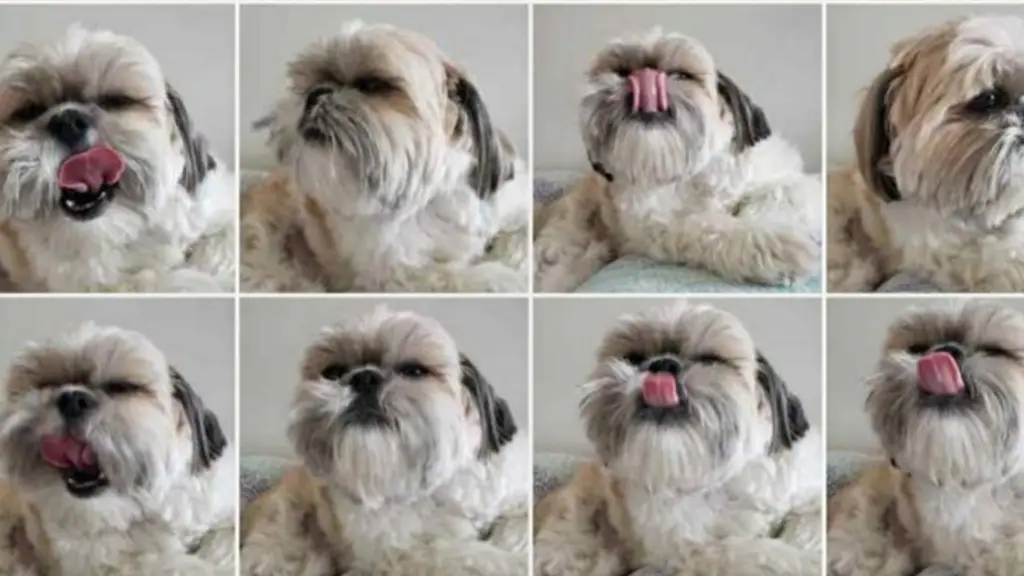
Due to the Shih Tzu’s prominent eyes and short muzzle, they are prone to specific eye-related issues. The shape of their skull means that their eyes are more exposed compared to other breeds, making them more susceptible to injuries and infections. Additionally, the shallow eye sockets of a Shih Tzu can increase the risk of the eyeball protruding or becoming displaced in severe cases, a condition known as proptosis. This unique anatomy requires careful attention and routine care to prevent problems and maintain your Shih Tzu’s eye health.
Common Eye Problems in Shih Tzus
Shih Tzus are predisposed to several eye conditions that can affect their vision and overall eye health. Being aware of these common issues can help you catch potential problems early and seek appropriate treatment. Dry eye (Keratoconjunctivitis Sicca) is a prevalent condition in Shih Tzus, where the eyes do not produce enough tears to keep them moist. This leads to dryness, irritation, and a higher risk of infection. Symptoms of dry eye include redness, excessive blinking, and a thick, sticky discharge from the eyes. If left untreated, dry eye can result in corneal ulcers or even vision loss.
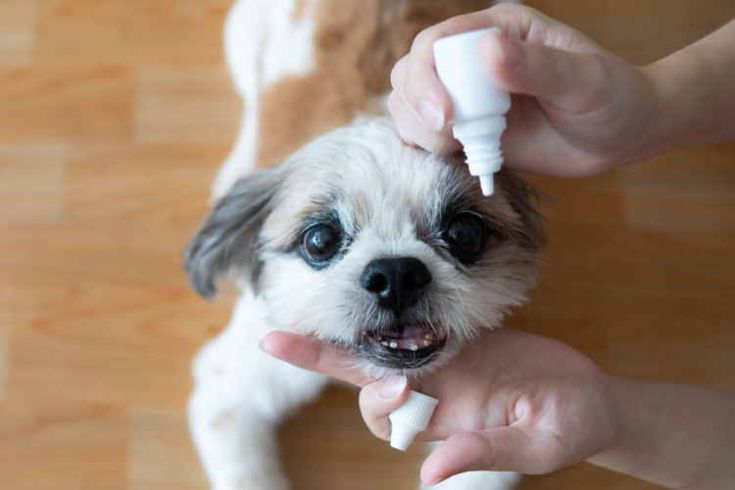
Corneal ulcers are another significant concern for Shih Tzus. These ulcers occur when the cornea, the eye’s outer layer, is damaged due to injury, infection, or chronic dryness. Corneal ulcers are painful and can cause the eye to become red, swollen, and sensitive to light. You may also notice your Shih Tzu pawing at their eye or squinting frequently. Immediate veterinary care is necessary to treat corneal ulcers and prevent further complications.
Progressive Retinal Atrophy (PRA) is a genetic condition that affects the retina and can lead to gradual vision loss. While PRA is not painful, it is a progressive disease that eventually causes blindness. Early signs of PRA include difficulty seeing at night, bumping into objects, and reluctance to go outside in dim lighting. Unfortunately, there is no cure for PRA, but early diagnosis can help manage the condition and slow its progression.

Entropion is a condition where the eyelids roll inward, causing the eyelashes to rub against the cornea. This can lead to irritation, inflammation, and corneal ulcers if left untreated. Shih Tzus with entropion may exhibit signs of excessive tearing, squinting, and pawing at their eyes. Surgical correction is often required to prevent further damage and relieve discomfort.
Cataracts are another common eye problem in Shih Tzus, especially as they age. Cataracts cause the eye’s lens to become cloudy, leading to vision impairment. You may notice a milky or bluish appearance in your Shih Tzu’s eyes if they have cataracts. While cataracts can sometimes be treated with surgery, not all cases require intervention, especially if the cataracts do not significantly affect your dog’s quality of life.
Daily Eye Care Routine for Your Shih Tzu

Maintaining a daily eye care routine is crucial for keeping your Shih Tzu’s eyes healthy and free from infections. Start by checking your Shih Tzu’s eyes daily for any signs of redness, discharge, or irritation. If you notice anything unusual, it’s essential to consult your veterinarian promptly. Regular eye cleaning can help prevent the buildup of debris and reduce the risk of infections. Use a damp, soft cloth or a cotton pad to gently wipe away any discharge or tear stains from around your dog’s eyes. Always use a separate cloth for each eye to avoid spreading bacteria or infection.
Using a veterinary-recommended eye cleaning solution can be beneficial, especially if your Shih Tzu is prone to tear staining or has sensitive eyes. Apply a few drops of the solution to a cotton pad and gently clean around the eyes, avoiding direct contact with the eyeball. Never use human eye drops or over-the-counter products without consulting your veterinarian, as some ingredients can be harmful to dogs.
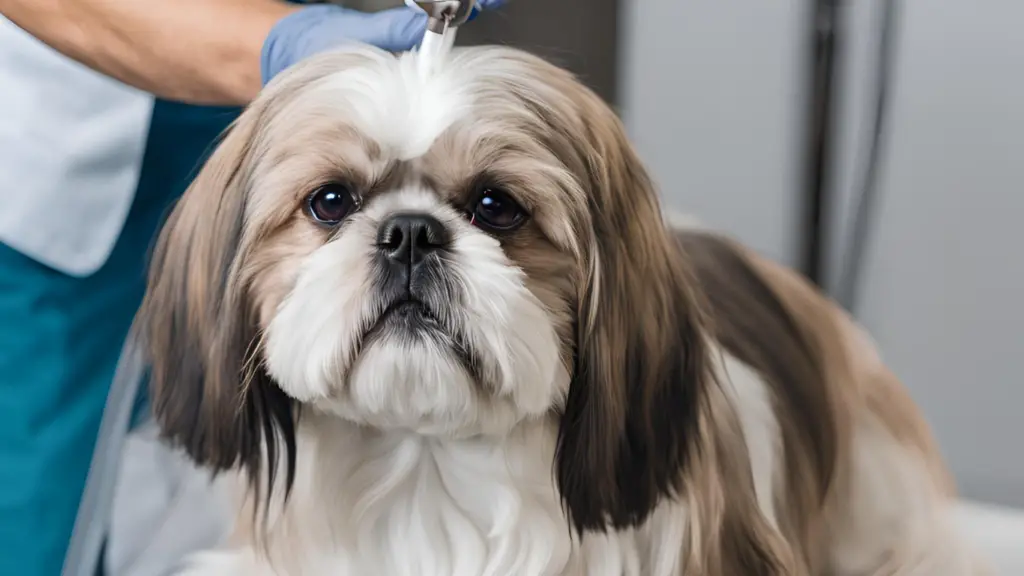
Trimming the hair around your Shih Tzu’s eyes is another essential part of their eye care routine. Long hair can irritate the eyes, trap dirt, and contribute to tear staining. Use blunt-tipped scissors to carefully trim the hair around the eyes, ensuring it is short enough not to touch the eyes but long enough to avoid cutting the skin. If you’re unsure about trimming your dog’s hair, consider having a professional groomer handle this task.
Regular tear stain removal is particularly important for Shih Tzus, as their light-colored coats are prone to staining. Tear stains can result from excessive tearing, which is common in Shih Tzus due to their facial structure. Use a tear stain remover specifically designed for dogs, or opt for natural remedies like a diluted solution of hydrogen peroxide (1 part hydrogen peroxide to 10 parts water) applied with a cotton pad. Be cautious when using any products around the eyes, and always follow the manufacturer’s instructions.

Monitoring tear production is another vital aspect of your Shih Tzu’s eye care routine. Insufficient tear production can lead to dry eye, which, as mentioned earlier, can cause significant discomfort and lead to more severe issues if left untreated. If you notice your Shih Tzu’s eyes are consistently dry or if they produce a thick, yellowish discharge, consult your veterinarian for advice on managing dry eye.
Proper Nutrition for Eye Health
Nutrition plays a crucial role in maintaining your Shih Tzu’s eye health. A well-balanced diet rich in vitamins, minerals, and antioxidants can help prevent eye problems and support overall eye function. Vitamin A is particularly important for vision, as it helps maintain the health of the retina and supports the production of essential eye pigments. Foods rich in vitamin A include carrots, sweet potatoes, and leafy greens. Incorporating these foods into your Shih Tzu’s diet, either as part of their regular meals or as healthy snacks, can contribute to better eye health.

Omega-3 fatty acids are another essential nutrient for eye health. These fatty acids help reduce inflammation and support the overall health of the eyes, particularly the retina. Omega-3s can be found in fish oils, such as salmon or sardine oil, and can be added to your Shih Tzu’s diet as a supplement. Always consult your veterinarian before introducing any new supplements to ensure they are appropriate for your dog’s specific needs.
Zinc is a mineral that plays a role in protecting the eyes from oxidative damage and supporting the immune system. Foods high in zinc include beef, chicken, and pumpkin seeds. Including zinc-rich foods in your Shih Tzu’s diet can help protect their eyes from age-related damage and support their overall eye health.

Lutein and zeaxanthin are antioxidants found in high concentrations in the eyes, particularly in the retina and lens. These antioxidants help protect the eyes from oxidative stress and can reduce the risk of developing cataracts or other age-related eye conditions. Lutein and zeaxanthin are found in kale, spinach, and eggs. Adding these foods to your Shih Tzu’s diet can provide additional support for their eye health.
Beta-carotene, a precursor to vitamin A, is another important nutrient for eye health. It helps maintain healthy vision and supports the overall function of the eyes. Carrots, squash, and cantaloupe are excellent sources of beta-carotene. Including these foods in your Shih Tzu’s diet can help ensure they receive adequate levels of this essential nutrient.
Vitamin C and Vitamin E are powerful antioxidants that help protect the eyes from damage caused by free radicals. These vitamins can be found in a variety of fruits and vegetables, such as oranges, strawberries, and bell peppers. Incorporating these foods into your Shih Tzu’s diet can provide additional protection for their eyes and support their overall health.
Grooming Tips to Prevent Eye Problems
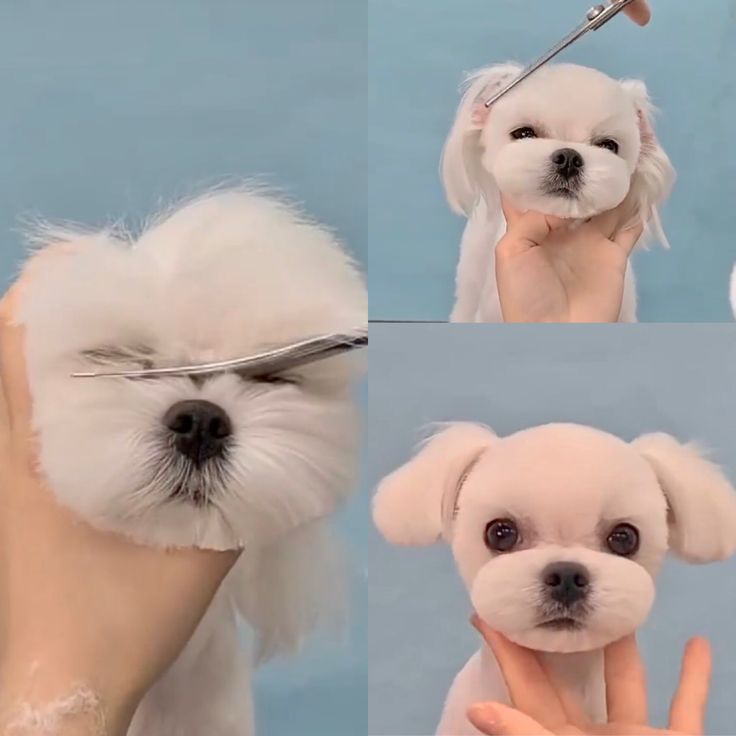
Proper grooming is essential for preventing eye problems in Shih Tzus. Their long hair and facial structure can contribute to eye irritation and increase the risk of infections if not properly managed. Regular grooming sessions should include checking and cleaning the area around the eyes, trimming the hair, and ensuring that the eyes are free from debris.
Trimming the hair around the eyes is one of the most critical grooming tasks for Shih Tzu owners. As mentioned earlier, long hair can irritate the eyes and trap dirt, leading to infections and tear staining. Use blunt-tipped scissors to carefully trim the hair around the eyes, ensuring it is short enough not to touch the eyes but long enough to avoid cutting the skin. If you’re uncomfortable trimming your Shih Tzu’s hair, consider having a professional groomer handle this task.
Bathing your Shih Tzu regularly is another important grooming practice. During baths, be sure to protect your dog’s eyes from shampoo and water, as these can cause irritation. Use a tear-free shampoo specifically designed for dogs, and gently rinse the face with a damp cloth instead of spraying water directly onto it. After bathing, check the eyes for any signs of redness or irritation and clean the area around the eyes to remove any leftover shampoo or debris.

Brushing your Shih Tzu’s coat regularly is also crucial for preventing eye problems. A well-maintained coat is less likely to shed excessively or cause irritation around the eyes. Use a soft-bristle brush or a comb specifically designed for dogs to gently brush your Shih Tzu’s coat, paying particular attention to the hair around the eyes. Regular brushing helps remove loose hairs and prevents them from getting into the eyes.
Cleaning the eye area regularly is essential for preventing infections and reducing tear staining. Use a damp cloth or cotton pad to gently wipe away any discharge or tear stains from around the eyes. Always use a separate cloth for each eye to avoid spreading bacteria or infection. If your Shih Tzu is prone to tear staining, consider using a veterinary-recommended tear stain remover or a natural remedy like a diluted hydrogen peroxide solution.
Checking your Shih Tzu’s eyes for foreign objects is another important grooming task. Due to their large, prominent eyes, Shih Tzus are more susceptible to getting dirt, dust, or other debris in their eyes. During grooming sessions, carefully inspect your dog’s eyes for any foreign objects and gently remove them using a damp cloth or saline solution. If you notice any redness, swelling, or discomfort, consult your veterinarian for advice.
Recognizing Signs of Eye Problems Early
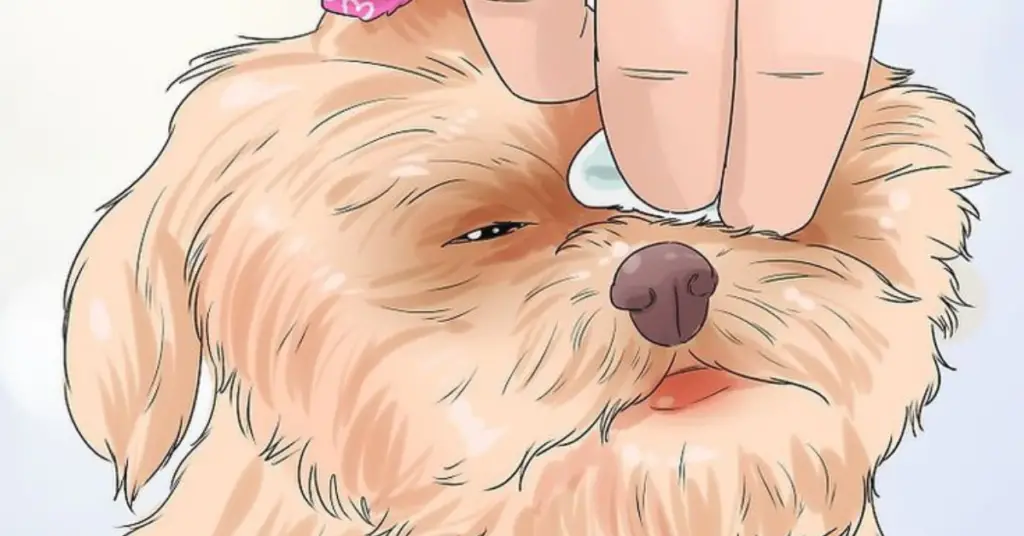
Early detection of eye problems is crucial for ensuring prompt treatment and preventing more serious issues. As a Shih Tzu owner, it’s important to monitor your dog’s eyes regularly and be aware of any changes in their appearance or behavior. Redness, swelling, or discharge from the eyes can indicate an infection, irritation, or other underlying conditions that require veterinary attention.
If your Shih Tzu is squinting, pawing at their eyes, or keeping one eye closed, these are signs that something may be wrong. These behaviors can indicate pain or discomfort, and it’s important to seek veterinary care as soon as possible. Excessive tearing or the presence of a thick, yellowish discharge can also be signs of an eye problem, such as dry eye or an infection.
Cloudiness or a change in eye color can indicate the presence of cataracts or other eye conditions that require veterinary evaluation. If you notice your Shih Tzu’s eyes becoming cloudy or if the color of their eyes changes, it’s important to consult your veterinarian for a thorough examination.
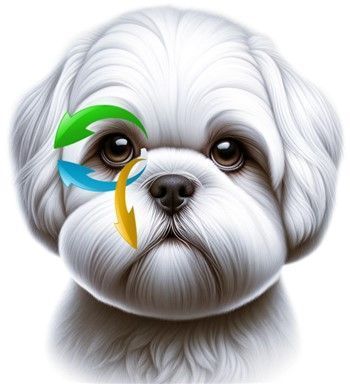
Changes in vision are another important sign to watch for. If your Shih Tzu is bumping into objects, hesitant to go outside in dim lighting, or having difficulty navigating their environment, these could be signs of vision loss. Progressive retinal atrophy (PRA) and cataracts are common causes of vision loss in Shih Tzus, and early detection can help manage the condition and slow its progression.
Behavioral changes can also indicate an eye problem. If your Shih Tzu becomes more irritable, lethargic, or withdrawn, this could be a sign that they are experiencing discomfort or pain related to their eyes. Pay attention to any changes in your dog’s behavior and seek veterinary care if you notice anything unusual.
The Role of Regular Veterinary Checkups
Regular veterinary checkups are essential for maintaining your Shih Tzu’s eye health and catching potential problems early. Your veterinarian can perform a comprehensive eye examination to assess the overall health of your dog’s eyes and identify any underlying conditions. During these checkups, your vet will examine the cornea, retina, and other parts of the eye, check for signs of infection or injury, and test tear production.
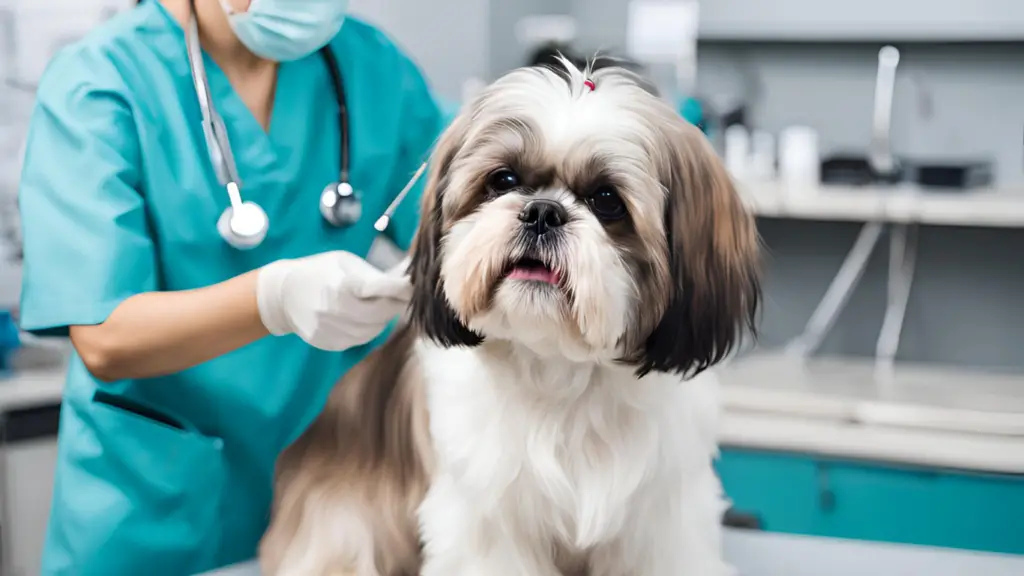
Your veterinarian can also diagnose and treat common eye conditions, such as dry eye, corneal ulcers, and cataracts. Early detection and treatment of these conditions can prevent more serious complications and help maintain your Shih Tzu’s vision. If your dog has a genetic predisposition to certain eye conditions, your veterinarian may recommend more frequent checkups or additional tests to monitor their eye health.
In addition to routine checkups, it’s important to seek veterinary care if you notice any signs of eye problems, such as redness, swelling, discharge, or changes in behavior. Prompt treatment can prevent the condition from worsening and help ensure a positive outcome for your dog.
Your veterinarian can also provide guidance on preventive care and recommend products or supplements that can support your Shih Tzu’s eye health. This may include advice on grooming, nutrition, and the use of tear stain removers or eye drops. Following your veterinarian’s recommendations can help keep your Shih Tzu’s eyes healthy and prevent common problems.
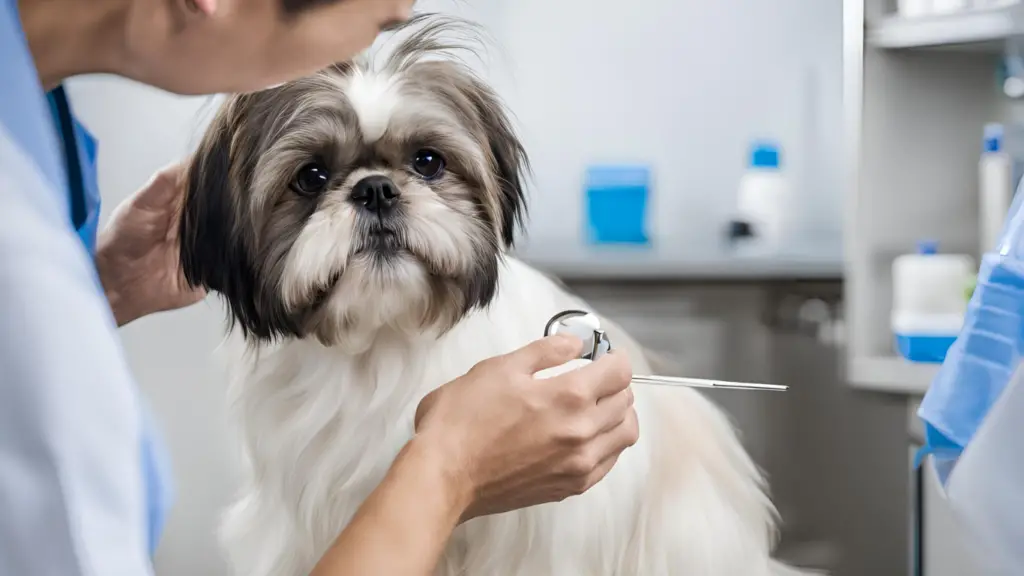
Regular checkups also provide an opportunity to discuss any concerns or questions you may have about your Shih Tzu’s eye health. Your veterinarian can offer advice on how to care for your dog’s eyes, recognize signs of potential problems, and take preventive measures to protect their vision.
How to Safely Administer Eye Medications
If your Shih Tzu requires eye medication, it’s important to know how to administer it safely and effectively. Whether it’s eye drops, ointments, or other medications, proper administration is crucial for ensuring the medication works as intended and does not cause additional discomfort or irritation.
Before administering any eye medication, wash your hands thoroughly to prevent introducing bacteria or other contaminants into your dog’s eyes. Make sure you have the medication and any necessary supplies, such as a clean cloth or cotton pad, within reach.

When administering eye drops, have your Shih Tzu sit or lie down in a comfortable position. Gently lift their chin and use your other hand to hold the medication bottle. With your thumb, carefully pull down the lower eyelid to create a small pocket. Squeeze the prescribed number of drops into the pocket, being careful not to touch the eye with the tip of the bottle. Release the eyelid and allow your dog to blink, which will help spread the medication across the eye’s surface.
For ointments, the process is similar, but instead of drops, you’ll apply a thin ribbon of ointment along the inside of the lower eyelid. Again, avoid touching the eye with the tube’s tip. After applying the ointment, gently close your dog’s eye and massage the eyelid to help distribute the medication.
If your Shih Tzu is resistant to eye medication, try rewarding them with treats or praise after each application to create a positive association. It may also help to have another person assist you in holding your dog steady while you administer the medication.

It’s important to follow your veterinarian’s instructions regarding the frequency and duration of the medication. Even if your dog’s symptoms improve, continue administering the medication as prescribed to ensure the infection or condition is fully treated.
If you have any concerns about administering eye medication or if your dog experiences any adverse reactions, such as increased redness, swelling, or discomfort, contact your veterinarian for further advice.
Preventing Eye Injuries in Shih Tzus
Due to their large, prominent eyes, Shih Tzus are more susceptible to eye injuries. Preventing these injuries is crucial for maintaining your dog’s eye health and preventing complications. Supervising your Shih Tzu during playtime, especially when they are interacting with other dogs or playing with toys, can help prevent accidental injuries. Avoid using toys with sharp edges or small parts that could potentially harm your dog’s eyes.

When walking your Shih Tzu, be mindful of environmental hazards, such as low-hanging branches, thorny bushes, or debris on the ground, which could cause eye injuries. Using a short leash can help you maintain control and guide your dog away from potential dangers. Additionally, avoid letting your Shih Tzu stick their head out of car windows, as this can expose their eyes to dust, dirt, and other debris that could cause injury.
Regular grooming is also essential for preventing eye injuries. As mentioned earlier, trimming the hair around your Shih Tzu’s eyes can prevent it from irritating the eyes or causing scratches. Ensuring that your dog’s coat is clean and free from mats or tangles can also reduce the risk of hair getting into the eyes.
If your Shih Tzu participates in activities that could potentially result in eye injuries, such as agility training or hiking in rough terrain, consider using protective eyewear designed for dogs. These goggles can provide an extra layer of protection and help prevent injuries from environmental hazards.

Training your Shih Tzu to avoid potentially dangerous situations is another effective way to prevent eye injuries. Teach your dog basic commands, such as “leave it” or “stay,” which can help you guide them away from harmful objects or situations. Consistent training and supervision can reduce the likelihood of accidents that could result in eye injuries.
In the event of an eye injury, it’s important to seek veterinary care immediately. Eye injuries can worsen quickly and may lead to complications if not treated promptly. If your Shih Tzu has sustained an injury, avoid attempting to treat it at home, as this could cause further damage. Instead, keep your dog calm and comfortable, and transport them to the veterinarian as soon as possible.
The Emotional Impact of Eye Problems on Shih Tzus
Eye problems can have a significant emotional impact on Shih Tzus, affecting their behavior, mood, and overall well-being. Vision loss or chronic eye conditions can cause your dog to feel anxious, disoriented, or frustrated, especially if they are no longer able to navigate their environment as easily as before.
If your Shih Tzu is experiencing vision loss, it’s important to make adjustments to their environment to help them feel more secure. Avoid moving furniture or making sudden changes to your home’s layout, as this can confuse your dog and increase their anxiety. Providing a consistent and predictable routine can also help your Shih Tzu feel more comfortable and less stressed.

Behavioral changes are common in dogs with eye problems. Your Shih Tzu may become more clingy, irritable, or withdrawn as they adjust to their condition. It’s important to be patient and understanding during this time, offering extra support and reassurance. Spending quality time with your dog and engaging in activities they enjoy can help boost their mood and reduce feelings of frustration or anxiety.
If your Shih Tzu is struggling to adjust to vision loss or a chronic eye condition, consider working with a professional trainer or animal behaviorist who specializes in helping dogs with disabilities. They can provide guidance on how to modify training techniques, create a safe environment, and address any behavioral issues that may arise.
Interactive toys and games can also help keep your Shih Tzu mentally stimulated and engaged, even if their vision is impaired. Toys that rely on scent or sound, rather than sight, can be particularly beneficial for dogs with vision problems. Providing your dog with plenty of mental and physical stimulation can help prevent boredom and reduce anxiety.

It’s also important to maintain a positive attitude and avoid expressing frustration or sadness about your dog’s condition. Dogs are highly perceptive and can pick up on their owners’ emotions. By staying positive and focused on providing the best care possible, you can help your Shih Tzu adjust to their condition and maintain a good quality of life.
Regular veterinary checkups are essential for monitoring your Shih Tzu’s eye condition and ensuring that they receive the appropriate care. Your veterinarian can offer advice on managing your dog’s condition and recommend any necessary treatments or lifestyle adjustments.
Conclusion
Caring for your Shih Tzu’s eyes is a vital part of ensuring their overall health and well-being. These adorable peepers require regular attention and care to prevent common problems like infections, tear staining, and vision loss. By maintaining a consistent grooming routine, providing a balanced diet rich in eye-supporting nutrients, and monitoring for any signs of eye problems, you can help keep your Shih Tzu’s eyes healthy and bright.

Regular veterinary checkups play a crucial role in early detection and treatment of eye conditions, ensuring that your Shih Tzu receives the best care possible. In the event of an eye injury or serious condition, prompt veterinary attention is essential to prevent complications and protect your dog’s vision.
Understanding the emotional impact of eye problems on your Shih Tzu and making adjustments to their environment can also help them cope with any challenges they may face. By staying informed and proactive, you can provide the care and support your Shih Tzu needs to enjoy a happy and healthy life, with those beautiful eyes shining bright.


